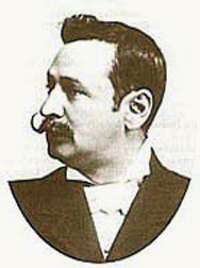Joaquín Dicenta


Joaquín Dicenta Benedicto (Calatayud, February 3, 1862 – February 21, 1917) was a Spanish journalist, novelist, playwright and poet. His 1895 play Juan José was the second-most performed in the Spanish repertory between then and 1939.
Joaquín Dicenta started his studies in the Escolapios College in Getafe. His literary career began with the publication of his poems in the tabloid Eden. Gradually, as he gained fame, he began writing in other journals. He was a fervent opponent of the social order and this is reflected in his works.[1]
Many of Joaquín's works, including stories and novels have been lost. Perhaps the most famous of his works was te play Juan José (1895). The play's socialist tone and its tale of the conflict between employers and employees made it a huge success among the working class. It was performed yearly in Spain during May. The play's content of social struggle did not go down well with some Spanish bishops, who rejected it. But the play remained successful, being translated into several languages.[1]
Example of his poetry

"¡NO!"
¡Cuánto sufrí y qué solo!... Ni un amigo;
Ni una mano leal que se tendiera
En busca de la mía, ni siquiera
El placer de crearme un enemigo.
De mi angustia y dolor, solo testigo,
De mi terrible vida, compañera,
Fue una pobre mujer, una cualquiera
Que hambre,pena y amor partió conmigo.
Y hoy que mi triunfo asegurado se halla,
Tú, amigo, por el éxito ganado,
Me dices que la arroje de mi lado,
Que una mujer así, denigra... ¡Calla!
Con ella he padecido y he triunfado;
¡Y el triunfo no autoriza a ser canalla!
References
- 1 2 "Joaquin Dicenta". Biographies & Lives. Retrieved 28 September 2013.
External links
|